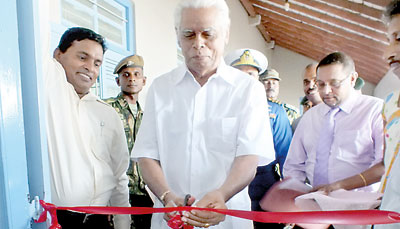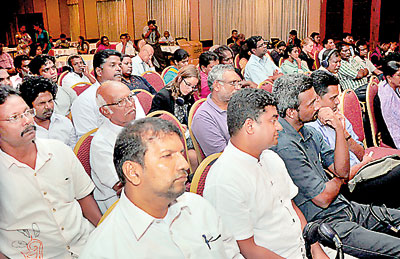News
United Nation’s World Press Freedom Day
View(s):Media should safeguard the country’s image rather than fuel political animosity, says Keheliya
A workshop on the theme “Patriotism and the role of the media” was organised by the Government Information Department to commemorate World Press Freedom Day. A message from Minister Keheliya Rambukwella was read out by the Government Information Director General Prof. Ariyaratne Ethugala stating that the media should safeguard the image and portray development of the country rather than fuel political animosity. He stated that the media is a powerful and trustworthy tool in moulding the opinion of the people and understanding and that it is playing an important role similar to the legislature, the executive and the judiciary.
“Distorting of information, misleading the people and destabilising society by using the media are also taking place. In this regard that it is important that the professional journalists should act with the right understanding. As it has been emphasised in the Mahinda Chintana, it is my belief that instead of using the media to fuel political animosity, it should be used with self restraint for achieving the country’s social, cultural and economic development objectives and to raise the glorious name of the country without damaging social and moral ethics,” he stated.
The minister went on to say that as it has been acknowledged in the Constitution the right of the people to freedom of language and freedom of expression and if these rights are not being implemented properly people will lose faith in democracy. “If the people get correct information about things happening in the country at all times, they will come to the right conclusions,” he stated.
The minister said with media freedom institutions that practice journalism have also increased and it is “essential to identify the right path the media should take.” He also stated that the workshop conducted that day will trace a clear path to understand the road map of journalism.
Also speaking at the event Mass Media and Information Ministry Secretary Charitha Herath said the media should serve as a bridge to build the country. He further stated that proper regulation and a set of ethics are essential for the media. He said a time has come to rebuild Sri Lanka through patriotism by taking national interests forward and added the media plays a vital role to do so.
The workshop was held at the Government Information Department auditorium.
PCCSL in Jaffna to serve aggrieved Northern Province readers
JAFFNA – The Press Complaints Commission of Sri Lanka (PCCSL), the self-regulatory body of the newspaper industry, opened an office in Jaffna on Friday, May 3, at 2.30 pm at 117, Station Road, Jaffna, to coincide with the United Nation’s World Press Freedom Day.

Founder of the Thinakurral newspaper, S.P. Samy cutting the ribbon. Pix by T. Premananth
This comes in the wake of a series of physical attacks on Jaffna-based newspapers, blamed on pro-government ‘elements’, an accusation hotly denied by the authorities.
A representative gathering of the clergy, government and military officials, publishers, editors, and journalists from the Jaffna-based media were present at the opening, where PCCSL officials spoke of their efforts to bring about amicable settlements between aggrieved readers and the media over published news items, by way of conciliation, mediation and arbitration to the satisfaction of all parties.
The Jaffna branch of the PCCSL is aimed at serving the needs of the Northern Province newspaper readers, including government authorities who may have a complaint against an inaccurate publication and facilitate their complaint reaching the PCCSL’s main office in Colombo.
The complaints will be inquired into by the PCCSL Secretariat in Colombo and the Commission’s 11-member Dispute Resolution Council chaired by former Secretary General of Parliament and the country’s first Ombudsman, Sam Wijesinha.
The branch office was declared open by the founder of the Thinakurral newspaper, S.P. Samy who is also Chairman of the Northern Central Hospital in Jaffna, the biggest private hospital in the Northern Province, with the participation of the Jaffna Archdeacon Rev. S.J. Jeyaveerasingan, the Jaffna Brigade Commander, Brigadier Chandana Gunawardene, Lake House Jaffna Branch Manager, J. Sudaharan, Jaffna College Principal,, Vaddukoddai Noel Vimalendran and District Child Protection Officer, District Secretariat, Jaffna Ms. S. Kothai among others.
This is the 20th Anniversary of World Press Freedom Day, since it was announced by UNESCO, and also the 10th anniversary of the PCCSL.
The PCCSL is supported by the Newspaper Society of Sri Lanka, The Editors’ Guild of Sri Lanka, Free Media Movement, Sri Lanka Working Journalists Association, Sri Lanka Press Institute (SLPI), Sri Lanka College of Journalism (SLCJ), Sri Lanka Tamil Media Alliance (STMA), Sri Lanka Muslim Media Forum (SLMMF), Federation of Media Employees Trade Union (FMETU) and South Asia Free Media Association (Sri Lanka Chapter).
A media statement by the PCCSL announced that their Jaffna Office will be open from Monday to Friday from 8.30 a.m. to 5 p.m. (For more information call 0214 927 000 – Jaffna or 011-53 53 635 -Colombo).
Journalists are truth-seekers who must prevail over tyranny
Democracy is above the will of the majority – even if the majority agrees certain things should not occur, said Dr. Rohan Edrisinha, citing the 1982 referendum in a lecture on “Freedom of speech and expression and the rule of law” organised by the Free Media Movement in Colombo to mark the World Press Freedom Day on Friday.
“Sri Lanka is a good example for the tyranny of the majority,” he said, adding that the ‘82 referendum, held at the directive of the then president J.R. Jayewardene to prolong the life of parliament for another six years without holding a general election, could never be morally or constitutionally justified.
There were some essential rationales behind the freedom of expression, Dr Edrisinha noted. The quest for the truth was one, and no opinion should be silenced because the silenced opinion may contain the heart of the truth. Another rationale was the “market-place of ideas” – the truth would come out only when there was free public discourse.
Dr. Edrisinha, who is constitutional advisor to the United Nations Development Program (UNDP) in Nepal, said journalists in Nepal played a vital role in strengthening democracy in that country. “There are over 150 ethnic groups and more than 100 languages but thanks to the efforts of the journalists these ethnic groups are now discussing democracy, federalism and presidential system,” he said.
The existence of a democracy or a government that reflects the will of the people depended on the availability of political choices. “We have choices: we have a number of socialist parties,” Dr. Edrisinha said, noting that these groups could never get together for some “obscure ideology” and their membership was dwindling.
He said there were a number of elected dictatorships in Asia, and freedom of expression was important to curb the abuse of power by such governments. Tolerance of the difference is another aspect of freedom expression, he added. “There is a rise in religious fundamentalism in Asia. It is, therefore, important that people should be tolerant.”
Judges and lawyers bore responsibility for upholding the rule of law and protecting the freedom of expression. The Supreme Court struck down the attempt by the previous regime to create a broadcast authority, aiming at controlling not only the government but also the private media.
Dr. Edrisinha also pointed out that there were “gaps in the Supreme Court rhetoric and its decisions”. The court, eloquent about the freedom of expression on certain occasions, had given very conservative judgments. On one occasion it even upheld emergency regulations against the freedom of expression, he pointed out.
Even in Contempt of Court proceedings the judiciary and the legal community should strike a balance, he said. Sri Lankan courts remained “very conservative with regard to the applicability of sub-judice rule when commenting on the cases pending before courts whereas there are international standards which are more liberal”.
Right to information, contempt of court and sub-judice rule are questions that should be addressed strategically. The country would rather have nothing than a badly-drafted Right of Information Act, he said. Dr. Edrisinha said it was a positive development that even the United Nations had recognised it was important for journalists to be able to carry out their work in safety. UN Chief Ban Ki-moon, in his message, said this year’s Press Freedom Day highlighted the need for action to uphold the right of journalists to carry out their vital work, he said.
Divided media easy to isolate, attack and made submissive: Scribes
A lack of unity among media is a major reason for attacks on news institutions and journalists and the restriction of their freedom, industry practitioners said last week. Journalists met at the Sri Lanka Press Institute (SLPI) in Narahenpita on Friday to discuss the topic “Safe to Speak: Securing Freedom of Expression in all Media”, sponsored by UNESCO to mark World Press Freedom Day.

Section of the audience at the SLPI in Colombo
On the panel were SLPI Chairman and Express Newspapers Managing Director Kumar Nadesan, the Sunday Times Deputy Editor Ameen Izzadeen, Derana News and Current Affairs Head Shehan Baranage, TNL Radio Network Head Sunesh Rodrigo, Sunday Leader Editor-in-Chief Shakuntala Perera and Vikalpa online magazine Chief Editor Sampath Samarakoon.
Journalists were divided along ethnic lines, pointed out Mr. Izzadeen. As a result of this disunity, the media had lost its collective strength. For example, Sinhala and English newspapers reported the fuel price hike in February last year, by saying the country was paralysed. Tamil newspapers, however, took a different line. They reported a US Embassy press conference at which it was announced that the US would back the resolution on Sri Lanka, when it comes up before the UN Human Rights Council.
If all media spoke in one voice on issues, the impact would be much greater, Mr. Izzadeen said. He was backed by Mr. Sunesh who also said Sri Lankan journalists lacked unity. “How many journalists actually protested when the Uthayan News institution was attacked, or when a journalist was harassed, assaulted or killed?” he asked. “Has there been any instance of more than 100 people gathering in protest?”
“This is where journalists have failed,” Mr. Sunesh opined. He also said many Sri Lankan media institutions were owned or influenced by parties closely associated with the government. This contributed towards politicisation, undue influence and bias. “Journalists have failed to safeguard ethics, and therefore, have let down the whole industry,” said Ms Perera.
“There is nothing to celebrate in this day,” observed Mr. Samarakoon. “Many journalists were murdered or assaulted, but till today, nobody has been arrested for any of these deeds.” “Several blogs and websites have been blocked in recent times,” he said, adding that it was not surprising Sri Lanka was ranked a poor 162 in the Reporters without Borders World Press Freedom Index.
Mr. Baranage differed. He said journalism in Sri Lanka was not as restricted as it is claimed. “We don’t have boundaries and we do have freedom of expression,” he insisted. “The public were increasingly using new technologies and media to express their views without being shackled.”
According to UNESCO statistics, more than 600 journalists have been killed worldwide, during the past 10 years.
Follow @timesonlinelk
comments powered by Disqus




















